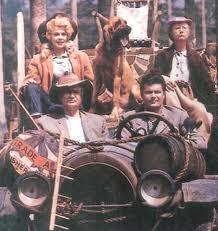“We stand today on the edge of a new frontier-the frontier of the 1960s, a frontier of unknown opportunities and perils-a frontier of unfulfilled hopes and threats.” ~ John Fitzgerald Kennedy
The end of Mister Ed
There are conflicting stories involving of the death of Bamboo Harvester, the horse that played Mister Ed. By 1968, Bamboo Harvester was suffering from a variety of health problems. In 1970 he was euthanized with no publicity, and buried at Snodgrass Farm in Oklahoma. However, a different version was given by Alan Young. Young wrote that he'd frequently visit his former "co-star" in retirement. He states that Mr. Ed died from an inadvertent tranquilizer administered while he was "in retirement" in a stable on Sparks St in Burbank, California where he lived with his trainer Lester Hilton. Young says Hilton was out of town visiting relatives and a temporary care giver might have seen Ed rolling on the ground, struggling to get up. Young said Ed was a heavy horse and he was not always strong enough to get back on his feet without struggling. The theory is the care giver thought the horse was in distress and administered a tranquilizer and for unknown reason, the horse died within hours. The remains were cremated and scattered by Hilton in the Los Angeles area at a spot known only to him.
A different horse that died in Oklahoma in February 1979 was widely thought to be Bamboo Harvester, but this horse was in fact a horse that posed for the still pictures of "Mister Ed" used by the production company for the show's press kits. After Bamboo Harvester's death in 1970 from kidney disease, this horse was unofficially known as Mister Ed, which led to him being reported as such (including sardonic comments on Saturday Night Live's Weekend Update) following his own death.
Young said that when the Oklahoma horse death story came out in 1979, he knew it was not the real Mister Ed, but did not have the heart to "shatter their illusions" that the horse being memorialized was not the real Mister Ed. He believes it was the horse used for early publicity photos.
A different horse that died in Oklahoma in February 1979 was widely thought to be Bamboo Harvester, but this horse was in fact a horse that posed for the still pictures of "Mister Ed" used by the production company for the show's press kits. After Bamboo Harvester's death in 1970 from kidney disease, this horse was unofficially known as Mister Ed, which led to him being reported as such (including sardonic comments on Saturday Night Live's Weekend Update) following his own death.
Young said that when the Oklahoma horse death story came out in 1979, he knew it was not the real Mister Ed, but did not have the heart to "shatter their illusions" that the horse being memorialized was not the real Mister Ed. He believes it was the horse used for early publicity photos.
mywriterssite
A Lassie's tail ...yeah I know but the pun was too good to pass up
Thomas Noel "Tommy" Rettig played "Jeff
Miller" in the first three seasons of CBS's Lassie television series, from
1954–1957, later seen in syndicated re-runs as Jeff's Collie. He also
co-starred with another former child actor, Tony Dow, in the mid-1960s
television teen soap opera Never Too Young and recorded the song by that title
with the group The TR-4.
Before his famous
role as Jeff Miller in the first Lassie television series, Rettig also appeared
in about 18 feature films including So Big, The 5,000 Fingers of Dr. T (written
by Dr. Seuss) Rettig later told interviewers that he longed for a life as a
normal teenager, and after four seasons, was able to get out of his contract.
He was also critical of the treatment and compensation of child actors of his
day. He reportedly received no residual payments from his work in the Lassie
series, even though it was syndicated and widely shown under the name Jeff's
Collie.
He graduated in 1959
from University High School in Los Angeles. In 1964–1965, he co-starred with
another former child actor, Tony Dow, in the ABC television soap opera for
teens, Never Too Young.
He found the transition from child star difficult, and had
several well-publicized legal entanglements relating to illegal recreational
drugs (a conviction for growing marijuana on his farm, and a cocaine possession
charge that he was exonerated of). Some years after he left acting, he became a
motivational speaker, which—through work on computer mailing lists—led to
involvement in the early days of personal computers.
For the last 15 years
of his life, Rettig was a well-known database programmer, author, and expert. He died at fifty-four of a heart attack.
mywriterssite











..png)



































